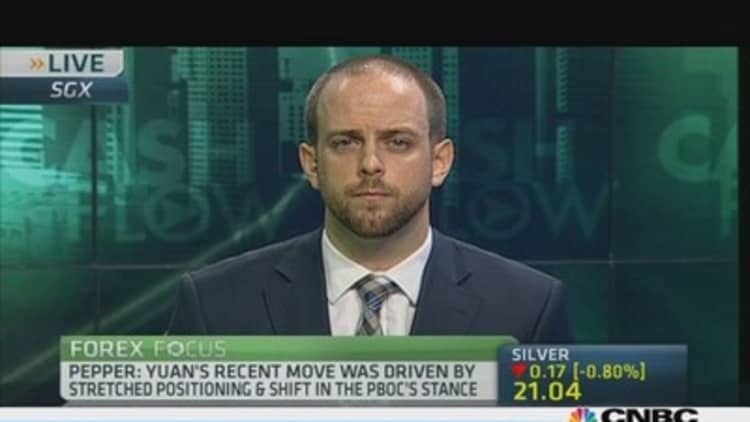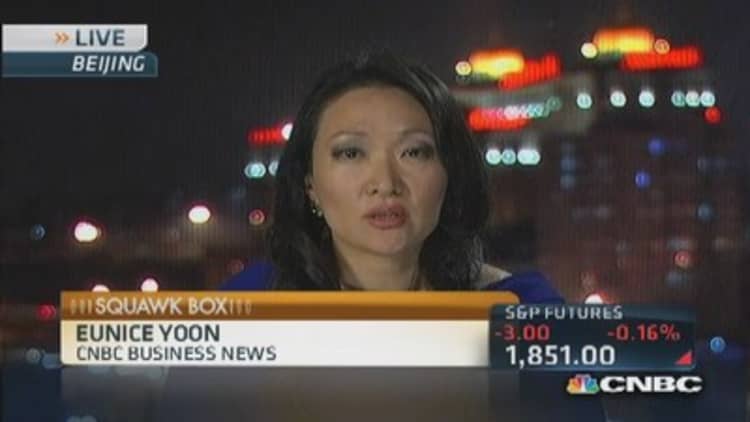Yuan weakness may put a spike in some companies' carry trades, adding another wrinkle of concern even as currency volatility has put emerging market corporate balance sheets under the microscope amid rising offshore debt loads.
"We have warned investors that the level of corporate indebtedness within emerging markets would mean that a close eye should be kept on corporate solvency," Jefferies said in a note.
(Read more: Are EM companies the real debt worry?)
With Shanghai Chaori Solar Energy becoming the first Chinese company to default on its offshore bonds, the role of yuan carry trades – or bets that the Chinese currency would continue to appreciate – are also a concern, the bank said.
The yuan, also known as the renminbi, unexpectedly weakened recently, depreciating around 1.4 percent against the U.S. dollar since the beginning of February. The move caught many investors off guard as yuan appreciation was widely seen as a one-way bet. The currency has attracted considerable foreign investor demand in recent years on its steady appreciation and relative stability.

Jefferies noted companies such as palm oil player Wilmar International have benefitted from the yuan's appreciation.
"In 2013, Wilmar paid a net interest expense of only US$19 million on US$14 billion of net debt on its books. This is because it earned over 5 percent interest income on its US$12 billion of renminbi deposits while paying just 2.2 percent interest on US$26 billion of largely U.S. dollar-denominated short-term debt," the bank said. "If the renminbi appreciation trend were to reverse, as it has done recently, Wilmar's net interest expense could potentially spike, unless its treasury moves quickly to mitigate the exposure."
(Read more: Are we being complacent over the yuan's decline?)
The figures may be subject to some interpretation. "We will not be able to confirm the figures in the Jefferies report as they are the analysts' own calculations," a Wilmar corporate communications representative said via email.
But the investment bank noted that overall, Hong Kong banks have loaned over $400 billion since the U.S. began its quantitative easing program or around 20-25 percent of its annual gross domestic product every quarter since 2010.
(Read more: Will a weaker yuan heighten China's property risks?)
"Some of this lending has been through Dim Sum bonds, loans and trade financed. Wilmar's financial actions are probably just the tip of the iceberg," Jefferies said.
Concerns over the level of emerging market corporate debt have been heightened as many emerging market currencies have weakened as the U.S. Federal Reserve began unwinding its quantitative easing program.

Data from the Bank for International Settlements (BIS) show emerging markets' international corporate bond issuance rose to around $335.6 billion in 2013 from $151.5 billion in 2010, even as the average credit quality has been deteriorating.
"In an environment of rising global interest rates and emerging market currency depreciation, this hard currency debt could become increasingly difficult for borrowers to repay," Nomura said in a note last week.
(Read more: Debt headache for Thai tycoon as protests bruise baht)
To be sure, not everyone believes the level of corporate debt in emerging markets is a matter of great concern.
"The BIS are sort of leverage scolds," said Tim Condon, head of research for Asia at ING Financial, adding he isn't concerned the corporate debt levels will become a macro issue.
He noted the renminbi has appreciated, with few interruptions, for around eight years. "That is bound to have attracted some speculative positions behind it," he said. "I'm sure some corporates have done too much of that – and some individuals – but I'm not sure micro distress is a macro problem."
(Read more: Rare bond default warning in China a good thing?)
He's not alone. "As global interest rates rise, emerging market corporate debt costs will rise," noted Lorraine Tan, director of equity research at S&P Capital IQ. But she added, while that would make it more difficult for companies to raise capital ahead, "I don't think it should impede current instruments."
She expects rates will rise in "baby steps," and that it wouldn't be quickly enough to sink Asian companies. Within China, savings rates are also still controlled by the government and those rates also aren't likely to move quickly enough to become a major risk factor, she noted.
—By CNBC.Com's Leslie Shaffer; Follow her on Twitter @LeslieShaffer1

